Aid Convoy Enters Syria Enclave as Regime Presses Offensive
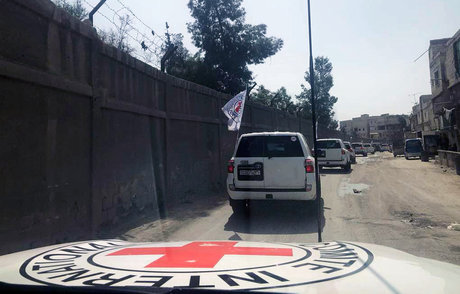
AFP
A U.N. convoy entered Syria's Eastern Ghouta on Monday to deliver much-needed aid as regime forces seized more ground in a fierce offensive to retake the battered rebel enclave.
The United Nations said 46 trucks had entered Eastern Ghouta and were headed for the main town of Douma, in the first aid delivery since the start of the regime assault last month.
The aid arrived after fresh air strikes hit Eastern Ghouta and regime troops were reported to have retaken a third of the enclave in a rapidly advancing offensive.
Western powers have piled pressure on Damascus and its Russian ally to end the offensive on Eastern Ghouta -- one of the bloodiest assaults of Syria's nearly seven-year civil war -- but President Bashar al-Assad warned there would be no let up.
More than two weeks of air strikes, artillery and rocket fire have left more than 700 civilians dead and three quarters of housing damaged in the enclave.
More bombs, including crude improvised munitions known as "barrel bombs", were dropped in overnight raids on Monday, according to the Syrian Observatory for Human Rights monitoring group.
At least 10 people were killed in the town of Hammuriyeh, said the Britain-based Observatory, which relies on a network of sources inside Syria.
Another four died in the towns of Hazeh and Jisreen, the monitor said, bringing to 709 the number of civilians killed since the assault began.
- 'Advancing at high pace' -
Regime troops and allied forces pushed into the enclave from the east in recent days and by early Monday had retaken a third of Eastern Ghouta, according to the Observatory.
"Regime forces are advancing at a high pace because operations so far are mostly conducted in farmland," Observatory head Rami Abdel Rahman said, adding that they had pushed to two kilometers (1.2 miles) southeast of Douma.
The armed groups there, one of which is made up of fighters from al-Qaida's ex-affiliate, have been lobbing mortar rounds and firing rockets on adjacent neighborhoods of Damascus, killing around 20 civilians in two weeks.
The latest ground offensive sent hundreds of civilians fleeing from their homes to other areas farther from the moving front line, compounding a humanitarian crisis which has drawn comparisons with the devastating 2016 battle of Aleppo.
Over the years, Eastern Ghouta's estimated 400,000 inhabitants have depended for their survival on smuggling, local farm and rare aid deliveries.
Monday's convoy was delivering "health and nutrition supplies, along with food for 27,500 people in need," the U.N.'s Office for the Coordination of Human Affairs (OCHA) in Syria said.
An OCHA spokesperson however said "the U.N. and partners were informed that many of the planned health supplies intended for Douma were not allowed to be loaded and not permitted to be replaced with other life-saving items."
"The items included trauma kits and other life-saving supplies," Linda Tom told AFP.
The U.N. has said it has approval to deliver aid to a total of 70,000 people among the most needy in Eastern Ghouta.
The United States issued a statement Sunday condemning the assault and accusing Moscow of ignoring a U.N. resolution calling for a 30-day cessation of hostilities.
It said Russia has killed "innocent civilians under the false auspices of counterterrorism operations."
U.S. President Donald Trump and British Prime Minister Theresa May said Russia and Syria were responsible for "heart-breaking human suffering" in Eastern Ghouta.
Moscow has offered safe passage to non-combatants wishing to leave Eastern Ghouta during daily "humanitarian pauses", but no Syrian civilians have left the enclave since the first break in fighting took effect on Tuesday, the Observatory says.
Damascus and Moscow have accused rebels of preventing civilians from leaving to use them as human shields.
In remarks broadcast on state television on Sunday, Assad said his forces would push forward with the offensive.
"The majority (of people) in Eastern Ghouta want to escape the embrace of terrorism. The operation must continue," he said.
Latest News
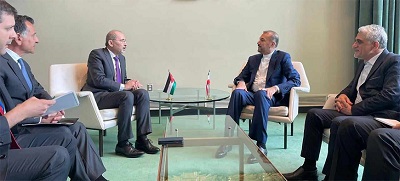 Safadi, Iranian counterpart discuss war on Gaza, regional escalation
Safadi, Iranian counterpart discuss war on Gaza, regional escalation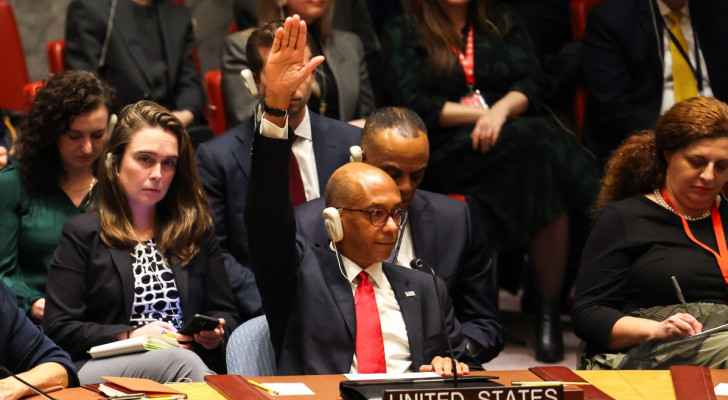 US vetoes Security Council resolution on full Palestinian UN membership
US vetoes Security Council resolution on full Palestinian UN membership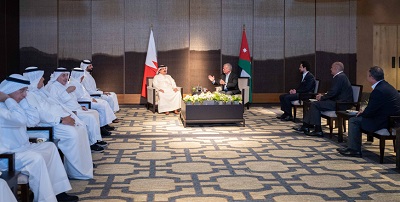 King, Bahrain monarch stress need to maintain Arab coordination
King, Bahrain monarch stress need to maintain Arab coordination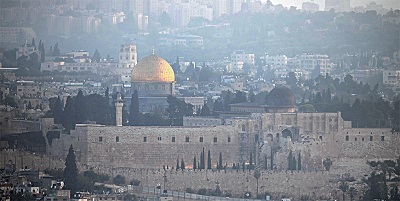 Security Council to vote Thursday on Palestinian state UN membership
Security Council to vote Thursday on Palestinian state UN membership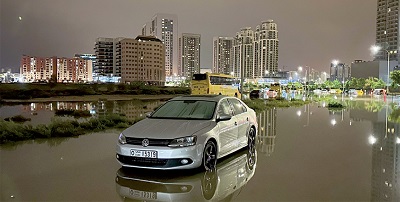 Dubai reels from floods chaos after record rains
Dubai reels from floods chaos after record rains
Most Read Articles
- Jordan urges UN to recognise Palestine as state
- Senate president, British ambassador discuss strategic partnership, regional stability
- Temperatures to near 40 degree mark next week in Jordan
- JAF carries out seven more airdrops of aid into Gaza
- Safadi, Iranian counterpart discuss war on Gaza, regional escalation
- UN chief warns Mideast on brink of ‘full-scale regional conflict’
- US vetoes Security Council resolution on full Palestinian UN membership
- Google fires 28 employees for protesting $1.2 billion cloud deal with “Israeli” army
- Biden urges Congress to pass 'pivotal' Ukraine, Israel war aid
- Israeli Occupation strike inside Iran responds to Tehran's provocation, reports say